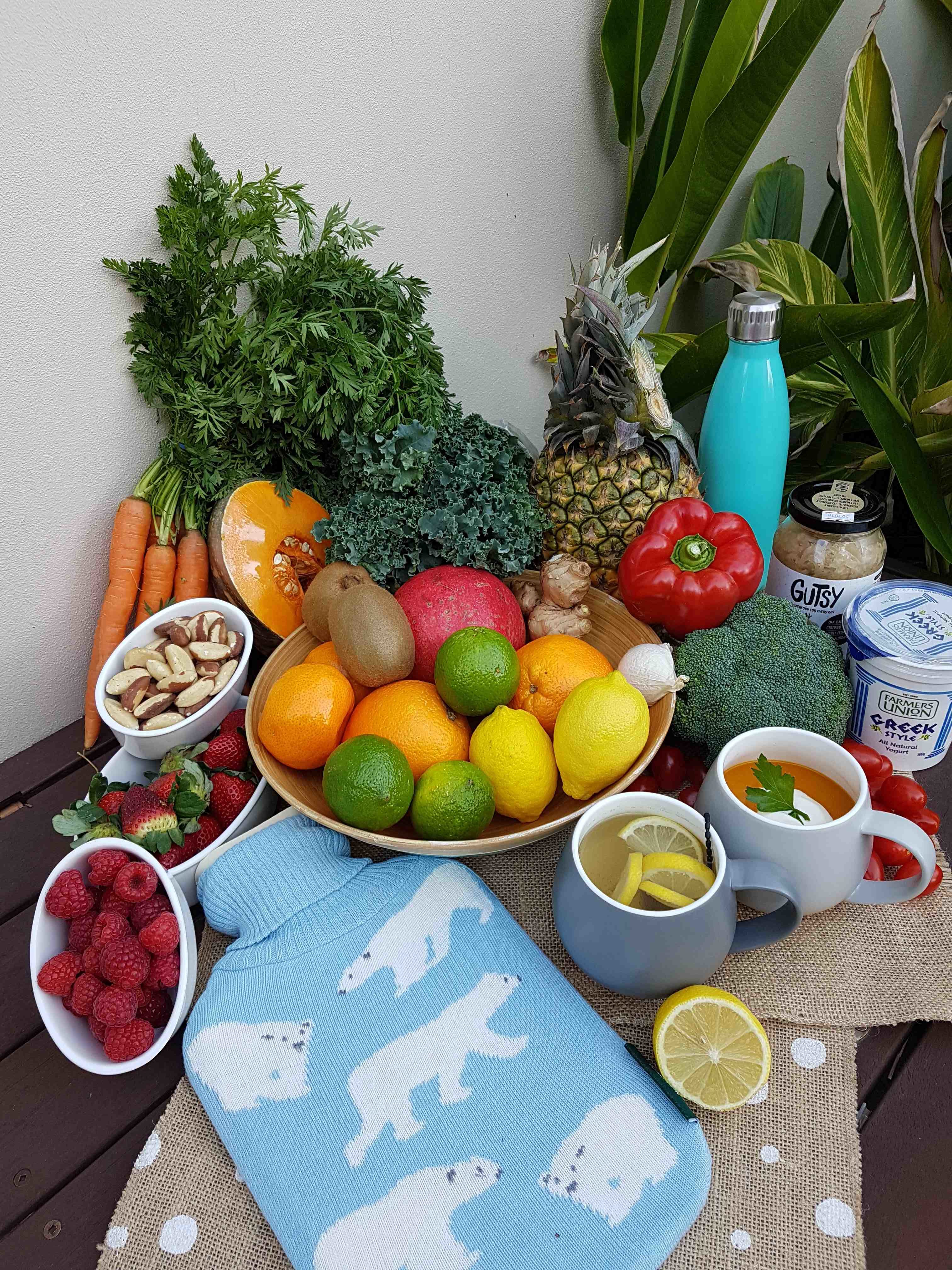As the cooler months settle in and the prevalence of the common cold and respiratory infections increase, how can you improve your immunity with the foods you choose? When your immune system is run-down (possibly with stress or poor lifestyle choices) you will be more prone to infection or illness. Ensure that you get some restorative sleep, daily movement and activity, adequate hydration and some valuable winter sunshine for your vitamin D levels.
 Eating plenty of foods with a high nourishment value will help improve your immunity and have your body functioning at its best. Nourish your body with foods that are packed full of antioxidants and other immune boosting nutrients such as vitamin A and C, iron, zinc and selenium.
Eating plenty of foods with a high nourishment value will help improve your immunity and have your body functioning at its best. Nourish your body with foods that are packed full of antioxidants and other immune boosting nutrients such as vitamin A and C, iron, zinc and selenium.
Vitamins
One of the functions of vitamin A (retinol) is to strengthen the lining of the gut and maintain moisture in the mucous membranes of the mouth, nose, throat and respiratory system. The strength and integrity of these membranes help fight off viruses and bacteria. Fill your meals with rich food sources retinol including meat, liver (if liked), fish, and sources of beta carotene (that the body converts to vitamin A) include dark green leafy vegetables, and orange vegetables such as carrot, pumpkin, sweet potato and apricots.
Vitamin C is a powerful antioxidant, adding value to the body’s immune response and it’s most people’s supplement of choice in winter. There is no conclusive evidence that taking Vitamin C will prevent colds and flu, however studies have found it can help reduce the duration and severity of the common cold. Ensuring you have a variety of foods rich in vitamin C (citrus, berries, kiwifruit, capsicum, kale, broccoli, tomato) is essential for immune health.
Of interest, recent research is investigating the impact of low vitamin D levels on immunity status and results are showing that people with the lowest vitamin D levels were having increased number of colds and flu. It may well be that vitamin D affects more than just our bone health, it may also play a key role in our immunity.
Minerals
Iron is an essential mineral our body requires to produce haemoglobin (red blood cells) that transports oxygen around the body, and is crucial for energy production, as well as immune function. Rich sources of iron include red meat, chicken, fish, lentils, eggs, nuts & seeds and green leafy vegetables. Enjoy these foods with vitamin C rich foods to increase the absorption within the body.
It is well known, that having low zinc levels is linked to lower immunity. Include foods that are rich in zinc, such as oysters, mussels, red meat, eggs and seeds to help boost your immunity. As with vitamin C, there is no evidence to support zinc supplementation for preventing of colds or infections. However, research does show zinc supplements (e.g. lozenge) at the start of a cold can reduce the duration and severity of a cold. However, this is only short-term solution and having a diet rich in zinc foods is the long-term goal.
Selenium is a micro-mineral that is a powerhouse for your immune system against bacterial and viral infections. You can meet your selenium needs with about 3 brazil nuts each day.
Gut Microbiome
Most of our immune system lies within our gut (80%), so naturally a healthy microbiome will contribute to improved immunity. Increase the diversity of your diet with plenty of plant-based foods to increase the diversity of your gut microbiome. There is good evidence that probiotics and indeed foods rich in probiotics will improve immune function. Probiotics are naturally present in fermented foods or “live” yoghurts (those containing acidophillus or lactobacillus). Prebiotics fuel our probiotics and helps to create an optimal environment for immune cells – find out how to increase your intake of probiotics and prebiotics in your food with my Gut blog.
Fluids
Drinking plenty of water and also some warm drinks such as weak tea, green tea, hot water with lemon and honey does help with congestion in upper respiratory system.
Your body’s immune system changes in response to the food that you eat daily, and the more nourishing foods you eat, the stronger your immune system will be. Naturally, every person and family has their own in-house remedy for sore throats, sniffs and sneezes such as ginseng, vitamin C, garlic, echinacea, elderberry and warm fluids. These may not make it to research study status, but if it works for you and is natural it can only add to the comfort and nurturing that you provide for a family member.


